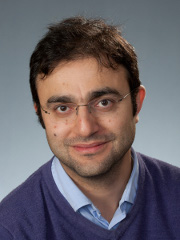Preliminary program:
Tuesday, June 28, 2016
| 8:30-9:00 | Registration |
| 9:00 | Opening |
| 9:00-10:15 |
Opening address
Session 1: Queueing applications (chair: Giuliano Casale)
|
| 10:15-10:50 | Break |
| 10:50-12:30 |
Session 2: Numerical methods (chair: Nail Akar)
|
| 12:30-14:00 | Lunch |
| 14:00-15:40 |
Session 3: Fluid queues (chair: Giang Nguyen)
|
| 15:40-16:15 | Break |
| 16:15-17:30 |
Session 4: Asymptotics and stability (chair: Peter Taylor)
|
| 18:00-20:00 | Boat trip on the Danube river |
Wednesday, June 29, 2016
| 9:00-10:15 |
Invited talk
Session 5: Branching processes (chair: Beatrice Meini)
|
| 10:15-10:50 | Break |
| 10:50-12:30 |
Session 6: Discrete queues (chair: Malgorzata O'Reilly)
|
| 12:30-14:00 | Lunch |
| 14:00-15:40 |
Session 7: Systems with multiple queues (chair: David Stanford)
|
| 15:40-16:15 | Break |
| 16:15-17:30 |
Session 8: Markov modulated Brownian motion (chair: Masakiyo Miyazawa)
|
| 19:00- | Conference banquet |
Thursday, June 30, 2016
| 9:00-10:15 |
Session 9: Risk, insurance and survival systems (chair: Srinivas Chakravarthy)
|
| 10:15-10:50 | Break |
| 10:50-12:30 |
Session 10: Distributions, processes and fitting (chair: Guy Latouche)
|
| 12:30-14:00 | Lunch |
| 14:00-15:15 |
Session 11: Markov models (chair: Dario Bini)
|
| 15:15-15:50 | Break |
| 15:50-16:15 |
Session 12: Population models (chair: Sophie Hautphenne)
|
| 16:15-16:40 |
Opening addressLászló Gerencsér:An interaction between queueing and change detectionA basic feature of a single server queue is waiting time recorded at the time of arrival of a new customer, following a simple non-linear dynamics. By a remarkable coincidence the same dynamics is obtained for what is called the the Page-Hinkley detector designed for real-time change detection of stochastic processes. According to this an alarm is given if the detector (an equivalent to waiting time) exceeds a prefixed threshold. A result on the empirical tail-probabilities of the detector under very general technical conditions will be presented, assuming no change, thus providing an upper bound for the false alarm rate. These results translate to results on empirical large deviations for waiting times. The above mentioned technical condition can be verified in a variety of interesting special cases to be briefly presented. References:
Gerencsér, L. and Prosdocimi, C. (2011): Input-output properties of the Page-Hinkley detector. Systems and Control Letters, 60 (7). pp. 486-491. Short bio:
László Gerencsér received his M.Sc. and Doctorate degree in mathematics at Eötvös Loránd University, Budapest, Hungary in 1969 and 1970, respectively. Since 1970 he has been with MTA SZTAKI (Computer and Automation Research Institute, Hungarian Academy of Sciences) with intermissions abroad. His first research papers are written in graph theory, including a widely cited paper with A.Gyárfás on a generalized Ramsey problem. He started his academic carrier in operations research, from which he moved to control and systems theory, in particular to system identification. In 1986 he held a one year visiting position at the Department of Mathematics, Chalmers University of Technology, Göteborg, Sweden. A major milestone in his academic life was a visit to the Department of Electrical Engineering, McGill University, Montreal, Quebec, Canada, from 1988 to 1991, as a visiting professor. He was awarded a Széchenyi Professorship with Eötvös Loránd University for the period of 1997 to 2001. His international activities include membership of the Conference Editorial Board of the IEEE Control Systems Society, 1998-2002, and his serving as an associate editor for the SIAM Journal of Control and Optimization, 1998-2004, and for the IEEE Transactions on Automatic Control, 2001-2004. He was the IPC Chair of the 19th International symposium on Mathematical Theory of Networks and Systems (MTNS 2010) Budapest, 2010. He is also the founder of the multidisciplinary Conferences on Applied Mathematics of the János Bolyai Mathematical Society. |
Invited talkKousha Etessami:The computational complexity of analyzing infinite-state structured Markov chains and structured Markov decision processesI will survey a series of results over recent years on the computational complexity of key analysis problems for several families of infinite-state structured Markov chains (MCs) and structured Markov decision processes (MDPs). A key aspect of our results is algorithmic bounds for computing the least fixed point (the least non-negative solution) for monotone systems of nonlinear (min/max)-polynomial equations which arise for these stochastic models and MDPs. In particular, I will describe algorithms based on Newton's method, combined with P-time preprocessing steps, which yield polynomial time algorithms (in the standard Turing model of computation) for computing, to arbitrary desired accuracy, the G matrix of quasi-birth death processes (QBDs), and the vector of extinction probabilities of multi-type branching processes (or Markovian trees). We then consider extensions of these purely stochastic models to MDPs. We describe a Generalized Newton's Method (GNM), which employs linear programming in each iteration, and we use GNM to obtain a P-time algorithm for computing, to desired accuracy, the vector of optimal (maximum or minimum) extinction probabilities for a given Branching MDP. We also study one-counter MDPs, which generalize discrete-time QBDs with control, and we give algorithms and complexity bounds for both qualitative and quantitative analysis of optimal termination probabilities for one-counter MDPs. Finally, we consider a model more general than the above stochastic models and MDPs, called recursive Markov chains (RMCs) and Recursive MDPs (RMDPs). RMCs are closely related to probabilistic pushdown systems and to tree-like-QBDs. We show that, in the worst-case, any non-trivial approximation of the termination probabilities of a RMC (or tree-like-QBD) is PosSLP-hard, and thus approximation in NP would already yield a breakthrough in exact numerical computation. For RMDPs (or tree-like-QBD-MDPs), we show that computing any non-trivial approximation of their optimal termination probability is not even computable at all (with any complexity). (This talk describes a series of results together with Alistair Stewart and Mihalis Yannakakis, as well as some older results with other co-authors.) Short bio:
Kousha Etessami is an associate professor (reader) in the Laboratory for Foundations of Computer Science in the School of Informatics at the University of Edinburgh. In the past he was a member of the research staff at Bell Laboratories. His research interests are in theoretical computer science, including: algorithmic game theory, equilibrium computation, algorithmic analysis and verification of probabilistic systems, Markov decision processes, stochastic games, analysis of infinite-state systems, model checking, automata, logic, and computational complexity theory. |


